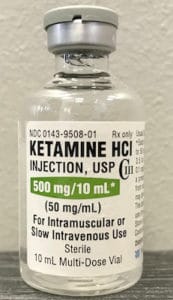
6 Questions To Ask Before Using Ketamine for Depression
Anyone looking start using ketamine for depression is going to have a lot of questions about the treatment ranging from how it works, can doctors prescribe ketamine for depression, the cost of the treatment and the long term effects of using ketamine for depression. Frshmind’s goal with this article is to educate you on basics of the treatment so you and your licensed health care provider can make an educated decisions as to whether or not using ketamine for depression is the right choice for you.
Table of Contents
What Does It Feel Like to Use Ketamine for Depression?

If you taken hallucinogens, you’ll notice that the ketamine experience is similar to that, but often lacking the euphoria. For a large number of people, it is perfectly normal to have trouble describing the ketamine experiences, but most descriptions are similar in that there is a physical sensation of heaviness while simultaneous feeling separated your body and consciousness. Details of experiences that are often upsetting are less so, allowing you to view things more objectively.
Patients also say that compared to the range of other depression treatments, most impressive is the rapid rate of effect of the drug; anxiety was quickly lowered and there was a feeling of alert calmness. Compared to the experiences of other treatments and medications, patients report feeling mentally alert and coherent. When going for your first treatment, it is not uncommonly to report being actively suicidal and rating your depression quite high. This session tends to subside a few days post treatment, as expected.
When used for non-anesthetic indications, ketamine creates a situation where patients dissociate and have what an expert might describe as a “ketamine-induced non-ordinary state of consciousness.”, which can be classified into 4 types of experiences (Kolp, Eli & L. Friedman, Harris & Krupitsky, Evgeny & Jansen, Karl & Sylvester, Mark & Young, Matthew & Kolp, Anna. (2014). Ketamine Psychedelic Psychotherapy: Focus on its Pharmacology, Phenomenology, and Clinical Applications. International Journal of Transpersonal Studies. 33. 84-140. 10.24972/ijts.2014.33.2.84.).
Empathogenic Experience
- Awareness of body
- Comfort and relaxation
- Reduced ego defenses
- Empathy, compassion, and warmth love and peace
- Euphoria
- Mind is dreamy with non-specific colorful visual effects
Out of Body Experience
- Complete separation from one’s body
- Significantly diminished ego defenses
- Visits to mythological realms of consciousness
- encounters with non-terrestrial beings
- Emotionally intense visions (e.g., deceased relatives, spirits)
- Vivid dreams of past and future incarnations
- Re-experiencing the birth process
Near Death Experience
- Departure from one’s body
- Complete ego dissolution/loss of identity
- Experienced physical (body) and psychological (mind) death
- Experience being a single point of consciousness simply aware of itself
- Reliving one’s life aware of how actions have affected others, with moral judgment of self
Ego Dissolving Transcendental Experience
- Ecstatic state of the dissolution of boundaries between the self and external reality
- Complete dissolution of one’s body and self (soul)
- Transcending normal mass/time/space continuum
- Collective consciousness
- Unity with Nature/Universe
- Sacredness
How to Get Ketamine Prescribed for Depression
While ketamine can be prescribed by any medical doctor, it is only approved as as an anesthetic in a medical procedure by the Food and Drug Administration (FDA) so you can’t buy it at a pharmacy and administer it yourself. Rather than being a first-line treatment, ketamine is given when other antidepressants don’t work. It’s administered by an IV infusion in the arm, and typically the effects last for anywhere from days to weeks. It’s administered in a tapering sequence in which patients receive three infusions the first week, two in the second week, once weekly for the next three weeks, and then moving to maintenance of, on average, once per month.
The doctor who prescribed you the ketamine will refer you to a specialty doctor or clinic. Once you have a referral, the specialist doctor or clinic will do their own assessment of you to ascertain whether ketamine really is the right treatment for you by performing a history that covers:
- Your psychiatric history such as your current and past diagnoses, hospitalizations, suicidal behavior, etc.
- Your family psychiatric history.
- Your current and past medications/treatments.
- Your use of substances such as cigarettes, alcohol, marijuana, etc.
- Your medical history including experience with anesthesia.
- Your social history such as your social supports and living situation.
- Some conditions may preclude a person from receiving ketamine treatment and some medications need to be altered or discontinued for ketamine treatments to occur.
Where to Get Ketamine Treatment for Depression

Typically, ketamine is given via an intravenous (IV) infusion over the course of about 45 minutes either in a ketamine clinic or infusion clinic. Additionally, doctors may administer ketamine via an intranasal or intermuscular route. As ketamine can, potentially, be dangerous, people being given an infusion are closely monitored during and after the procedure.
What is the Cost of Ketamine Depression Treatment
While some people may tell you that ketamine therapy isn’t cheap, I’d offer that it is better to put that cost in perspective to the rest of your life.
Rather than looking at the cost of ketamine therapy from a dollar cost pint of view, it is better to look at it as an investment in your over all well being and increasing the quality of your life. In most cities the ketamine depression treatment cost ranges from $450 to $750 an infusion, with a higher cost charged for the first infusion. Most ketamine clinics follow a protocol of administering intravenous ketamine 3 times per week for 2 weeks at a cost of between $2000 and $3000.
Another question regarding ketamine depression treatment cost is whether health insurance will cover it. Most clinics are out of network, so while your insurance company may cover the cost of a portion of the treatment, you need to cover the costs with the clinic upfront. For more detailed information, please read “How Much Does Ketamine Treatment Cost?“
How Does Ketamine Treat Depression and Is it Safe?
People usually take antidepressants for a few weeks before they start to work as they need to build up in your system to have an effect. In comparison, ketamine is quite different. Its effects on depression happen as it leaves your body and while researchers aren’t sure why, one theory is that ketamine prompts connections to regrow between brain cells that are involved in mood. What a patient experiences during the ketamine infusion is very much dependent on the amount of ketamine administered during the infusion. When a patient is first getting an infusion, often the initial dose will be at the lowest recommended amount (usually 0.5 mg of ketamine for every 1 kg of the person’s weight). At the lower doses, one would less likely experience the out-body experience, near-death experience, or ego-dissolving transcendental experience.
Using Ketamine For Depression: How It May Help
First developed as an anesthetic with analgesic properties in the 50’s and 60’s, ketamine has a number of properties that lend itself to managing treatment resistant depression. While ketamine gained infamy as a hallucinogenic party drug, recent clinic research is attempting to change this perception
Ketamine for Depression: How it Works
What differentiates ketamine from other antidepressants is in the mechanism by which it works in a user’s brain. While traditional antidepressants typically focus on altering levels of serotonin and dopamine in the brain, ketamine is theorized to assist in repairing neuron synapses via the neurotransmitter glutamate. Ketamine is far better than the alternatives in the speed with which it takes effect. Normally, an antidepressant takes over a month to show any signs of working, and then takes the same or longer to get off of it before the next month process can begin; Ketamine, on the other hand, shows results within the first 24 hours after the infusion.
Ketamine works by 2 major pathways:
- Glycogen synthase kinase-3 (GSK-3) pathway: Results in the rapid antidepressant and anti-suicidal benefit of ketamine.
- Ketamine activates the production of brain-derived neurotrophic factor (BDNF): Ketamine increase BDNF and the number of receptors to which BDNF binds and over time, there is more repair factor and more receptors available to be activated by the repair factor. The outcome is that over a period of weeks, neuroplasticity and repair occur in the brain, leading to reduction in depression as it is the result of the breakdown in circuits and damage to the brain.
Ketamine for Depression Side Effects
Another aspect of Ketamine being used as a depression treatment is the fact that there are no known negative side effects. When looking at many of the drugs on the market today, a majority of them have a long list of possible side effects. A large number of patients report no lasting side effects of ketamine treatment.
Long-term Effects of Using Ketamine for Depression
Some mental health experts advise caution where ketamine is concerned, experts say we don’t yet know enough about its potentially negative consequences, especially from long-term use. The main drawbacks, he says, are that the beneficial effects of the drug wear off after 7 to 10 days, so most patients have to get infusions on a regular basis. “Some research studies have demonstrated that it can be toxic to brain cells and cause bladder damage, especially at higher doses,
Can Ketamine Cause Depression
There is no evidence that ketamine causes depression, but with any drug that alters levels of neurotransmitters, please speak with your healthcare provider.
Related Articles
- Check out Frshminds’ Guide to Ketamine Clinics to learn about ketamine in order to select a clinic that meets your needs.
- 5 Things You Should Know Before Starting Ketamine Infusions for Bipolar Depression
- The Secret to Getting Health Insurance to Cover Ketamine Therapy
- Your First Ketamine Therapy Session: What to Expect
- Ketamine as a Rapid Onset Antidepressant
- A Ketamine Clinic Near Me: Roots Behavioral Health
- A Ketamine Clinic Near Me: The Infusion Clinic of Ocala
- A Ketamine Clinic Near Me: Dr Ken Starr in Arroyo Grande
- Ketamine Assisted Psychotherapy (KAP): Demographics, Data and Outcomes
- Meet ‘Sarah’, She Uses Ketamine Infusion Therapy for Depression
- Talking with a Ketamine Infusion Doctor: Dr. Franklin

Comments